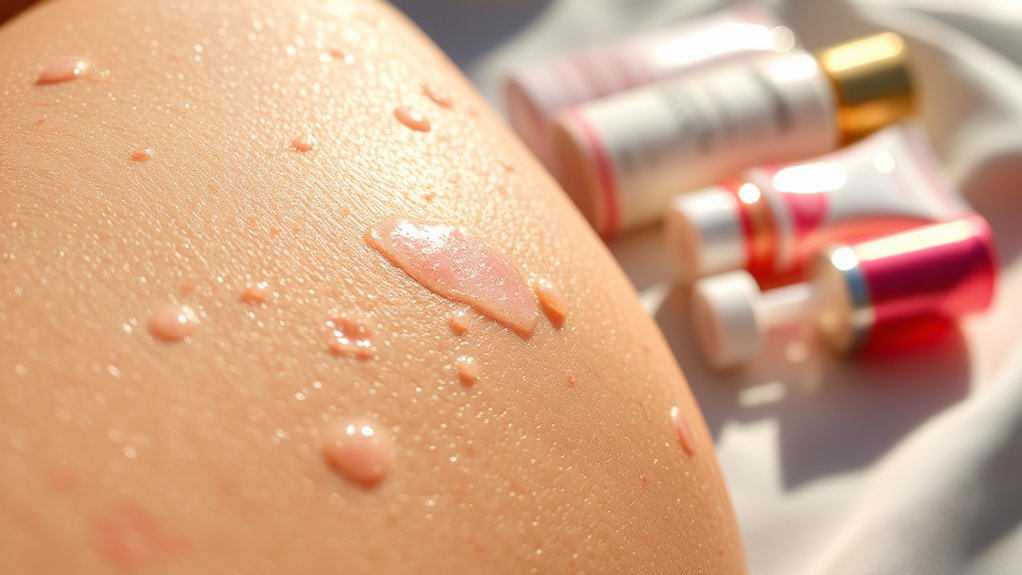Why Exfoliating More Might Be Damaging Your Skin
Over-exfoliating can severely damage your skin by disrupting its natural barrier, leading to redness, irritation, and increased sensitivity. When you remove too many dead skin cells, you compromise moisture retention, making your skin more prone to breakouts and infections. Frequent exfoliation can accelerate signs of aging and hinder your skin’s ability to protect itself. Striking a balance is key for maintaining healthy skin. Discover how to establish an effective exfoliation routine that works for you.
Understanding Exfoliation and Its Purpose
Although exfoliation is often hailed as a critical step in skincare, it’s essential to understand its true purpose and how it affects your skin.
Exfoliation helps remove dead skin cells, promoting cell turnover and allowing other products to penetrate better.
However, over-exfoliation in skincare can strip your skin’s natural barrier, leading to irritation and sensitivity.
Balance is key for healthy skin maintenance, as over-exfoliation can damage your skin barrier and result in long-term skin issues.
Signs of Over-Exfoliation
If you’re frequently experiencing redness, irritation, or an uncomfortable tightness in your skin, these could be clear signs of over-exfoliation.
You might also notice increased sensitivity, flaky patches, or breakouts that weren’t there before.
Over-exfoliation disrupts the skin barrier, leading to dehydration and inflammation. Additionally, excessive cleansing routines can further exacerbate the effects of over-exfoliation.
It’s crucial to scale back your exfoliation routine and allow your skin time to recover.
Types of Exfoliants: Physical vs. Chemical
After addressing the signs of over-exfoliation, it’s important to understand the types of exfoliants available: physical and chemical. Physical exfoliants use abrasives to slough off dead skin, while chemical exfoliants use acids to dissolve bonds between skin cells. Knowing the differences can help you choose the right exfoliant for your skin type. Additionally, understanding your specific skin type can significantly impact the effectiveness of your exfoliation routine.
| Type | Description | Examples |
|---|---|---|
| Physical | Abrasive particles | Scrubs, sponges |
| Chemical | Acids that dissolve dead skin | AHAs, BHAs, enzymes |
| Frequency | Can be used often | 1-2 times per week for some |
| Skin Type | Suitable for all | Sensitive skin benefits from less frequent use |
The Impact of Over-Exfoliation on the Skin Barrier
Over-exfoliating can wreak havoc on your skin barrier, leading to a host of issues that compromise your skin’s health and appearance.
The consequences include:
- Increased sensitivity and redness
- Compromised moisture retention
- Higher susceptibility to infections
- Accelerated aging signs
These problems stem from the disruption of your skin’s natural protective functions, underscoring the importance of moderation in your exfoliation routine. Furthermore, maintaining a balance in your skincare routine can help prevent widespread skincare mistakes, ensuring your skin remains healthy and vibrant.
How to Establish a Balanced Exfoliation Routine
Finding the right balance in your exfoliation routine isn’t just beneficial; it’s vital for maintaining healthy skin.
Begin by assessing your skin type—sensitive, oily, or combination. For most, weekly exfoliation is sufficient, using chemical exfoliants like AHAs or BHAs. It’s important to note that inaccurate skin type assessment can lead to over-exfoliation, which can damage your skin’s natural barrier.
Monitor your skin’s response, adjusting frequency and products as needed, ensuring you’re not stripping your skin’s natural barrier while still achieving a smooth texture.
Alternatives to Frequent Exfoliation for Healthy Skin
While frequent exfoliation may seem beneficial, there are effective alternatives that can maintain skin health without the risk of damage.
Consider these approaches:
- Use a gentle cleanser daily.
- Apply hydrating serums regularly.
- Incorporate antioxidants in your routine.
- Stay hydrated and maintain a balanced diet.
These methods promote cellular turnover and skin health, reducing reliance on harsh exfoliants. Additionally, hydration techniques such as using a humidifier can further enhance your skin’s moisture levels and radiance.

